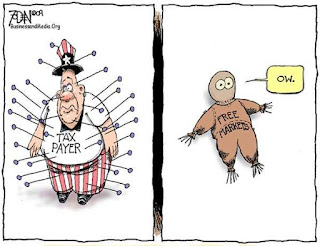This week, we are going to look at the very basics of what makes up American and Canadian democracy - what do you need to have to be considered a democracy. By looking at the basics of our political beliefs, and comparing it to those of the American's, it will help to determine whether the system we have in place really is the most effective or not.

As citizens in a democracy, we have a lot of rights and freedoms. However, there is the obligation of being a contributing member of society, but not all people know what that looks like. So this week, we will look at what our roles are in liberal society, what values come with democracy, how North American democracies were created and compare the political structures of the United States vs Canada, as we have two different types of democracies. Hopefully, we can look at electoral systems this week as well, which will make next week an opportunity to look at the downfalls of democracy.
On Thursday last week, we started looking at Canada's system of government.
Another Democracy and Its Separation of Powers: Austria
What will we be doing this week?
Monday:
- Finish notes on Canada's Democratic system and Electoral System
- America's Political Structure and Electoral System
- Go through Dictatorship for Dummies Project and pick a due date
Tuesday:
- Finish going through the American System
- Assignment: Compare and contrast the American and Canadian political systems
- The Alternative: Proportional representation
Wednesday:
- Finish notes on Proportional Representation
- Another alternative: Mandatory Elections

Thursday:
- Rants by Rebecca and Patricia
- Practice Writing Assignments:
- 30-1 - Assignment 1
- 30-2 - Assignment 1
OR
- Work on dictatorship projects
- Be aware that if there is little to no work done on either writing assignment or the projects (ie: a significant proportion of the class is snap chatting, just talking, talking about trucks, texting people, looking at instagram, etc) there will be NO further class time given to work on practice writing or your projects. It will ALL become homework, no exceptions. There is too much to get through for a large proportion of students to be wasting class time doing nothing.
Friday:
- Dictatorships: start the notes that are the basis of what dictatorships do





